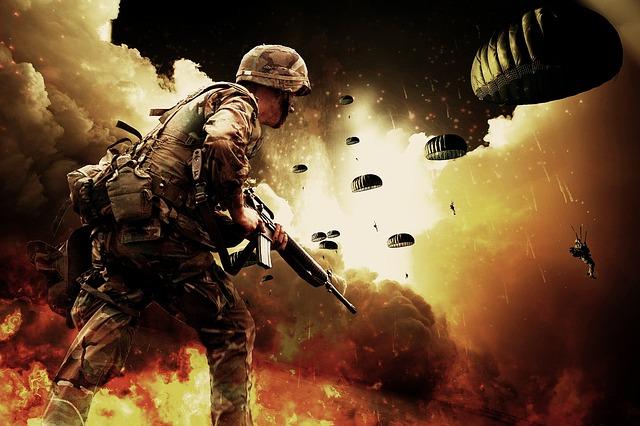As the conflict between Ukraine and Russia continues to unfold, the prospect of a resolution remains a topic of intense debate among policymakers, analysts, and citizens alike. The implications of ending this war are multifaceted, encompassing political, economic, and humanitarian dimensions that could reshape not only the future of the two nations involved, but also the broader geopolitical landscape of europe and beyond. In this article, we explore the potential outcomes of concluding the Ukraine-Russia war, examining scenarios that could emerge in the wake of a ceasefire, including territorial negotiations, economic repercussions, and the long-term impact on international relations. As we navigate through these possible futures, it becomes increasingly clear that the choices made now will resonate for generations to come.
Potential Geopolitical Shifts in Eastern Europe Following the wars Conclusion
The conclusion of the war between Ukraine and Russia is anticipated to cascade into various geopolitical consequences that could reshape Eastern Europe. With potential scenarios emerging, Eastern European nations may find themselves recalibrating alliances and redefining security strategies. Key outcomes could include:
- Expansion of NATO Influence: Countries like Poland and the Baltic states may further strengthen ties with NATO, seeking additional security guarantees.
- Russian Isolation: The post-war period may lead to deepening isolation for Russia, pushing it closer to non-Western alliances while alienating it from Europe.
- Increased Regional Nationalism: Nations like Hungary might pursue more aggressive nationalist policies, capitalizing on perceived vulnerabilities within a restructured geopolitical landscape.
Another significant consideration will be the economic impacts on the region, where recovery and investment can either catalyze development or exacerbate disparities.Economic shifts may result in:
| Economic Factor | Potential Impact |
|---|---|
| Foreign Investment: | With stability regained, countries might see a surge in foreign investment, especially in infrastructure and energy sectors. |
| energy Security: | European nations will increasingly seek to diminish reliance on Russian gas, prompting diversification of energy sources. |
| Migration Trends: | The end of conflict could lead to reverse migration,with displaced populations returning,potentially straining resources in affected areas. |

Economic Impacts on Ukraine and Russia: A Path to Recovery or Continued Struggles
The ongoing conflict between Ukraine and Russia has led to profound economic challenges for both nations, transforming their economies and landscapes in unprecedented ways. Ukraine, grappling with infrastructure damage and the disruption of agricultural production, has suffered a significant downturn.Major sectors, such as agriculture, which traditionally accounted for a large portion of its GDP, have been greatly hindered. The repercussions have not only amplified poverty rates but also strained social services, affecting the quality of life for millions. Conversely, Russia has experienced a mixed economic impact, facing international sanctions that have isolated its markets yet together spurring the development of self-sufficient strategies. The Russian economy has shown resilience in sectors like energy, which continues to provide ample revenue, despite facing challenges in import substitution and limited access to global markets.
Looking ahead, the potential outcomes of ceasing hostilities could yield differing paths for recovery. Both economies might experience a rebound, dependent on several factors, including tailored international aid packages, reinvestment opportunities, and access to global markets. Key elements of future recovery may include:
- Infrastructure Rebuilding: Significant investments woudl be necessary to restore war-torn areas.
- Trade Agreements: New partnerships could lead to increased trade flows and economic cooperation.
- Humanitarian Aid: International support could alleviate immediate suffering and bolster recovery efforts.
Though, the risk of prolonged economic struggles looms large, particularly if political tensions persist. The economic outlook remains uncertain and will largely be determined by how both nations navigate the post-war landscape, the potential for reintegration into the global economy, and the ability to foster sustainable development amidst ongoing geopolitical challenges.

humanitarian Challenges and the Road to Rebuilding Lives Post-Conflict
The aftermath of the Ukraine-Russia war presents multifaceted humanitarian challenges that must be addressed to pave the way for sustained peace and recovery. Millions have been displaced, leading to housing shortages, strained healthcare systems, and a high demand for psychological support services. Addressing these concerns will require coordinated efforts from local governments,international organizations,and NGOs. Key areas of focus will include:
- Rehabilitation of Infrastructure: rebuilding homes, schools, and hospitals to restore essential services.
- Support for Displaced Populations: Providing resources and opportunities for refugees and internally displaced individuals to reintegrate.
- Healthcare provision: Ensuring access to medical care,particularly for those affected by trauma and long-term health conditions.
- Psychosocial Services: Developing programs to address the mental health impact of conflict.
Furthermore, rebuilding lives post-conflict involves more than just addressing immediate humanitarian needs. It requires fostering economic stability and community resilience for long-term recovery. This can be achieved by diversifying local economies, supporting small businesses, and investing in education and vocational training. A collaborative approach that involves:
| Focus Area | Actions Needed | Expected Outcomes |
|---|---|---|
| Economic Recovery | Providing microloans and investment in local businesses | Job creation and income stability |
| Youth Engagement | Implementing educational programs and mentorship | Skilled workforce and future leadership |
| Community Cohesion | Facilitating community dialog and initiatives | Strengthened social ties and peacebuilding |
The path to rebuilding is fraught with challenges, yet it offers a unique opportunity to foster communities that are more resilient and integrated. Only by addressing both immediate needs and long-term growth can stakeholders ensure that the lessons learned from this conflict are not forgotten, paving the way for a sustainable peace that benefits all.

Strategies for Diplomatic Engagement to Prevent Future Conflicts in the Region
In the aftermath of the Ukraine-Russia conflict,it is crucial to establish a framework for diplomatic engagement that prioritizes long-term stability and peaceful relations. One effective approach could involve multilateral dialogues, where regional powers alongside international organizations collaboratively address key issues. Such conversations shoudl focus on:
- Border Security: Implementing joint patrolling initiatives to foster trust among neighboring states.
- Economic Cooperation: Creating trade agreements that benefit all parties, reducing reliance on adversarial tactics.
- Cultural Exchanges: Encouraging programs that promote mutual understanding and counteract divisive narratives.
Furthermore, establishing a dedicated regional conflict-resolution mechanism could lead to timely interventions in future disputes. This would necessitate the involvement of local leaders and representatives to ensure all voices are heard. Key components of this mechanism might include:
| Component | Description |
|---|---|
| Early Warning Systems | Monitoring potential flashpoints and sharing data between nations. |
| Mediation Frameworks | Designated mediators to facilitate dialogue between conflicting parties. |
| Joint Peacekeeping Forces | Deployment of neutral forces to maintain stability in contested areas. |

In Summary
the potential outcomes of ending the Ukraine-Russia war encompass a complex tapestry of diplomatic, economic, and social implications that will shape the future of the region and beyond. While a resolution could pave the way for rebuilding efforts and the restoration of stability, it also poses challenges, including the need for reconciliation and addressing the deep-seated grievances that have fueled the conflict. The international community plays a crucial role in facilitating dialogue and ensuring that any peace agreement is sustainable and just for all parties involved. As the situation develops, it is indeed imperative to remain vigilant and informed, as the ramifications of this conflict will resonate far beyond the borders of Ukraine and Russia. The path to lasting peace remains uncertain, but understanding the multitude of possible outcomes is essential for fostering a dialogue that prioritizes humanity, governance, and the rule of law.







